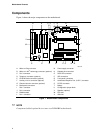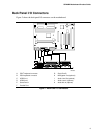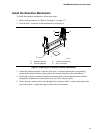
Motherboard Features
12
• Support for up to 127 physical devices
• Guaranteed bandwidth and low latencies appropriate for telephony, audio, and other
applications
✏
NOTE
Computer systems that have an unshielded cable attached to a USB port may not meet FCC
Class B requirements, even if no device or a low-speed USB device is attached to the cable. Use a
shielded cable that meets the requirements for a high-speed USB device.
A.G.P.
The A.G.P. is a high-performance interconnect for graphics-intensive applications, such as 3D
graphics. A.G.P. is independent of the PCI bus and is intended for exclusive use with graphical
display devices. A.G.P. provides these features:
• Pipelined memory read and write operations that hide memory access latency
• Demultiplexing of address and data on the bus for near 100 percent bus efficiency
• AC timing for 133 MHz data transfer rates, allowing real data throughput in excess of
500 MB/sec
BIOS
The motherboard’s system BIOS is contained in a flash memory device on the motherboard. The
BIOS provides the power-on self test (POST), the BIOS Setup program, and the PCI and IDE auto-
configuration utilities.
The BIOS is always shadowed. Shadowing allows BIOS routines to be executed from fast 64-bit
onboard DRAM instead of from the slower 8-bit flash memory device.
BIOS Upgrades
Because the BIOS is stored in a flash memory device, you can upgrade the BIOS by using a
software utility on a diskette or hard disk, or over a network. For information on upgrading the
BIOS, see Chapter 4.
PCI Auto Configuration
If you install a PCI add-in board in your computer, the PCI auto-configuration utility in the BIOS
automatically detects and configures the resources (IRQs, DMA channels, and I/O space) for that
add-in board. You do not need to run the BIOS Setup program after you install a PCI add-in
board.
However, PCI add-in boards use the same IRQ resources as ISA add-in boards. If you install both
a PCI and an ISA add-in board, you must specify the IRQ used by the ISA card. The PCI auto
configuration program complies with version 2.1 of the PCI BIOS specification.


















